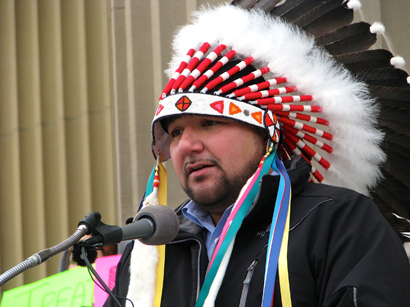By Jeremy Appel, Local Journalism Initiative Reporter
(ANNews) – Treaty 6 and 8 First Nations leadership have joined fellow First Nations leaders across Canada to call on the federal government to scrap its proposed One Canadian Economy Act, also known as Bill C-5.
The legislation, which was introduced in the House of Commons on June 6, has two components—reducing barriers to inter-provincial trade and enabling the government to fast-track infrastructure projects, including mines, ports and pipelines, that it deems to be in the “national interest.”
The latter part of the bill, which would reduce the average time for a project’s completion from five to two years, has raised red flags for First Nations leaders, who fear it will undermine Treaty rights, as well as the right to “free, prior and informed consent” enshrined in multiple articles of the United Nations Declaration of the Rights of Indigenous Peoples.
First Nations weren’t consulted on the legislation and were only provided with a summary of the bill a week before its introduction, according to a June 17 statement from the Confederacy of Treaty 6 First Nations.
“If this Bill passes, it will not create certainty for development. It will create conflict,” warned Confederacy Grand Chief Greg Desjarlais. “We are not opposed to building, but we will never be bullied and pushed aside.“
A June 16 statement from Treaty 8 First Nations of Alberta placed Bill C-5 in the context of an “ongoing pattern of legislative overreach, constitutional neglect, and Treaty violations.”
Treaty 8 First Nations Grand Chief Trevor Mercredi said the legislation “exposes Canada’s preferred strategy when dealing with Treaty Peoples: not through partnership or reconciliation, but through legislative fatigue—imposing policy knowing it will take us years to fight it in court.”
“Let us be clear: this strategy is no longer going to work,” Mercredi added.
He emphasized that Canada’s disregard for Treaty rights impacts its international standing.
“Canada cannot lead globally while violating fundamental legal agreements at home,” said Mercredi.
Chief Sheldon Sunshine of Sturgeon Lake Cree Nation in Treaty 8 noted that Canada’s obligations aren’t limited to the letter of the Treaties, but include inherent rights.
“Our rights are not defined by the Treaty—they pre-exist it,” said Sunshine.
Chief Billy-Joe Tuccaro of Mikisew Cree Nation, also in Treaty 8, said First Nations will no longer “be silenced while legislation is weaponized against our Peoples.”
“The days of watching from the sidelines as Canada writes laws about our lands without us is over,” he said.
Testifying at the June 17 Standing Committee on Transport, Infrastructure and Communities meeting, Assembly of First Nations National Chief Cindy Nepinak Woodhouse spoke of the First Nations needs that are ignored by Bill C-5.
“We want to talk about fast-tracking things here in our country. I wish we were talking about the construction of modern schools for our First Nations children,” said National Chief Nepinak Woodhouse.
“I also wish we were here talking about fast-tracking clean water and quality housing for First Nations people, or fast-tracking all-season roads and reliable internet access for our kids. But we’re not, and that’s a shame.”
In addition to First Nations leaders, environmentalists have criticized Bill C-5 for enabling the government to exempt national interest projects from certain regulatory laws, including the Fisheries Act, Species at Risk Act, Canadian Environmental Protection Act, Impact Assessment Act and the Indian Act.
Some Liberal MPs have also criticized their party’s legislation.
Burlington MP Karina Gould criticized the government’s failure to incorporate First Nations’ perspectives on the legislation.
“They have to hear those voices, and they have to ensure that they are being included in the process,” Gould told the Toronto Star.
Toronto MP Nathaniel Erskine-Smith told the Star that while he’s sympathetic with the intention of building infrastructure faster, it shouldn’t be done with “unfettered discretion and unchecked power in the government.”
“We’ve got to make sure there are guardrails,” he said.



Be the first to comment on "First Nations leaders in Alberta call on feds to scrap Bill C-5"